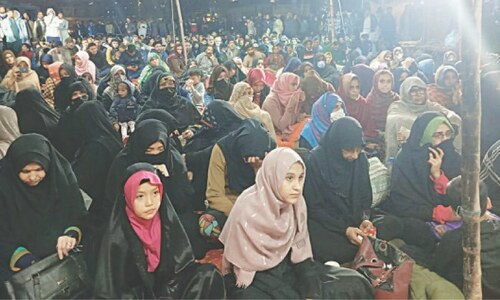KARACHI: The annual cost of traffic congestion on Karachi’s roads comes to about Rs200 billion, an amount equal to 1.5pc of Pakistan’s total GDP (Gross Domestic Product), a study conducted by the NED University of Engineering and Technology has found.
The findings of the research were shared at a programme at a local hotel on Tuesday.
The two-year study was aimed at determining the economic costs of traffic congestion by studying a stretch of the National Highway and Sharea Faisal (from Star Gate to Pakistan Steel Mills) that connects the Port Qasim Industrial Zone with the main city.
Giving a presentation on study findings, Dr Mohammad Adnan, associate professor at the department of urban and infrastructure engineering, the NED university, said the total direct traffic congestion cost of the selected stretch (in terms of vehicle operating cost and the time lost that could have been utilized in some constructive activity) had been estimated to be Rs10.18 million per day.
“On an annual basis, this figure will be approximately $37.15m, a significant amount that could be avoided by addressing the causes leading to traffic congestion,” he said, adding that if traffic congestion cost was extrapolated for the whole arterial network of Karachi (1,300km) by calculating per kilometer cost, it would come to around Rs200 billion.
And, he continued, if let the same conditions prevailed in the next five years, the Karachi congestion cost would exceed $4bn per year, which represented 11pc of the total GDP share of Karachi at that time.
The results, he said, had shown that average speed of vehicle on the selected stretch was 40 kilometres per hour and the time loss for all types of vehicles on an average was approximately 20 minutes per trip.
“The traffic volume at peak hours stood at 3,500 vehicles per hour against the road capacity of 3,400 vehicles per hour leading to massive congestion at peak hours. Moreover, with encroachments at various points along the road, the road capacity reduces significantly,” he said while explaining the reasons for traffic congestion.
Vice Chancellor of NED University Dr Mohammd Afzal Haque said that the research was first of its kind in the country and a good example of collaboration between educational institutions and the industry.
“Traffic congestion is one of the least understood subjects in our country. We need to analyse it scientifically and make efforts to know how traffic congestion is impacting other aspects of life,” he said.
The research was sponsored by the Indus Motor Company.
IMC chief executive officer Parvez Ghias and chairman department of urban and infrastructure of the NED University Dr Shabbar Ali also spoke.













































Dear visitor, the comments section is undergoing an overhaul and will return soon.